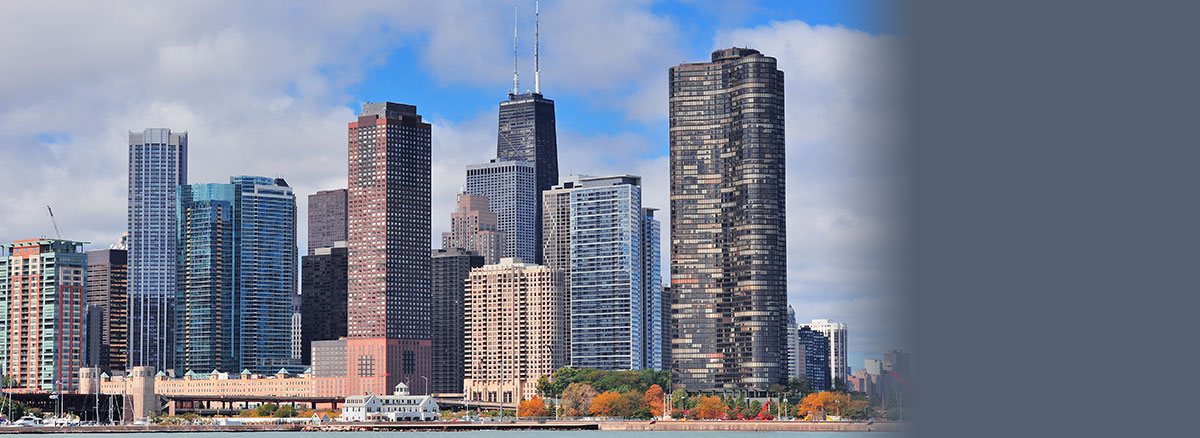
Get Answers from an Attorney in Chicago, IL to Common Questions about Landlords
Here are answers to some questions (FAQs) frequently asked of our Chicago Landlord Attorneys and Chicago Eviction Lawyers by Landlords owning Chicago buildings covered by the Chicago Residential Landlord and Tenant Ordinance (“RLTO”) and generally about evictions. The answers would be similar under the ordinances adopted by the City of Evanston and the Village of Mount Prospect. You should note that under RLTO, the prevailing plaintiff (not the defendant) is entitled to collect attorney fees and court costs if required to go to court to enforce his or her rights under RLTO. If you have further questions or if we can be of help, please contact one of our Chicago Landlord Eviction Attorneys at any time.
Security Deposits
Question
Do I have to give my Chicago tenant a receipt for the tenant’s security deposit?
Answer
Chicago’s RLTO is very specific as to the requirement of a receipt. A receipt must be given when the deposit is made. It must be signed by the person receiving the deposit, must include the name of the person receiving the deposit and the name of the landlord, if the person receiving the deposit is not the landlord. The receipt must also include the amount of the deposit, the date it was made and a description of the apartment for which the deposit was made. The tenant must also be given the name and address of the financial institution where the deposit is maintained. If a receipt meeting these requirements is not given, the tenant is entitled to return of the security deposit and to damages against the landlord of double the amount of the security deposit plus interest at 5% per annum.
Question
What restrictions are there on a Chicago landlord’s use of the tenant’s security deposit?
Answer
A Chicago landlord may not use the tenant’s security deposit in any way until after the tenant has vacated the apartment. Until then, the landlord must keep the security deposit in a federally insured bank account, completely separate from the landlord’s other funds. The landlord may accept payment of the tenant’s first month’s rent and security deposit in a single check, if but only if within 5 business days, he transfers the security deposit amount into a segregated account. The landlord must pay the tenant interest each year on the security deposit (if held more than six months) within 30 days after the end of each 12 month rental period at a rate set by the City of Chicago annually. If a landlord fails to meet these requirements, he may be liable to the tenant for damages of double the amount of the security deposit plus interest at 5% per annum.
Question
When must a Chicago landlord return the tenant’s security deposit?
Answer
A Chicago landlord must return the tenant’s security deposit within 45 days after the tenant vacates the apartment. The landlord may only make deductions from the amount of the security deposit for unpaid rent validly withheld or deducted, or for the reasonable amount necessary to repair any damage the tenant caused, not counting reasonable wear and tear on the apartment from the tenant’s use. If a landlord does deduct any amount for damage, he must provide the tenant with an itemized statement of the repair costs, supported by paid receipts or certifications, for any work performed by the landlord’s employees. If the Chicago landlord fails to meet these requirements, he may be liable to the tenant for damages of double the amount of the security deposit plus interest at 5% per annum plus the tenant’s attorney fees and court costs.
Question
What are the penalties for a security deposit violation in Chicago?
Answer
The Chicago landlord can be held liable to the tenant for damages equal to twice the security deposit plus attorney fees and court costs, for any violation.
(Click Here for Chicago Security Deposit Interest Rates and Rules)
Condition Issues
Question
What if I sign a rental agreement and I can’t get the apartment ready for the tenant when agreed?
Answer
If the apartment is not ready for the tenant when you agreed, the tenant may terminate the rental agreement upon written notice to you, or the tenant can file a legal action against you for possession and recover any damages the tenant may have sustained. If a Chicago landlord’s failure to deliver possession to the tenant is willful, the tenant may recover up to the greater of two months’ rent or twice the damages sustained by the tenant.
Question
What can my tenant do if there are serious problems with the conditions in the apartment or with the common areas of the building in which the tenant’s apartment is located?
Answer
Chicago tenants have several remedies for serious condition issues. First, if the problems are so serious as to render the apartment not reasonably fit and habitable, the tenant may terminate the tenancy by giving the Chicago landlord a notice which specifies the conditions and gives the landlord not fewer than 14 days to remedy the conditions. If the problems are less serious and the reasonable cost of compliance is less than the greater of $500.00 or one half of one month’s rent, your tenant may after notice and opportunity for you to perform the work, either have the work performed and deduct the cost from the rent or recover damages for the noncompliance.
Question
My Chicago building is landlord heated. What temperatures must I maintain?
Answer
Chicago landlords are required to provide heat to the following levels between September 15th and June 1st:
- 68 degrees, between 8:30 AM and 10:30 PM
- 66 degrees between 10:30 PM and 8:30 AM
Other Issues
Question
The tenant paid the $700.00 per month rent late last month, and I billed him for a $50.00 late fee. Must he pay the late fee?
Answer
No. Under RLTO, the most a landlord can charge as a late fee for an apartment subject to RLTO is $10.00 plus 5% of the rent in excess of $500.00 per month; so the highest late fee you can charge is $20.00 in this case. Any provision in your rental agreement to the contrary is not enforceable. Further, even if your tenant did not pay the late fee, merely by demanding the late fee of $50.00, you may have become liable for damages equal to two months’ rent, or $1,400.00.
Question
My Chicago tenant is behind on the rent. My wife suggests that I threaten to physically remove the front door and throw the tenant’s possessions out on the street. Will this work?
Answer
It is completely illegal to threaten to or to actually oust or dispossess a tenant or to interfere with a tenant’s possession of the rented Chicago apartment without authority of law. This includes removal of doors, physical removal, removing locks, blocking entry or exit or interruption of any essential services or threatening to do any of these things. The tenant will likely call the police, if you attempt to do this, and the police will side with the tenant. Further, you should know that you as a Chicago landlord would be liable under RLTO to pay the tenant the greater of double the damages suffered by the tenant or two month’s rent for having violated the ordinance in this manner, as well as being liable to restore the tenant to possession of the apartment if you have dispossessed the tenant.
Question
What Chicago residential properties are not covered by Chicago’s RLTO?
Answer
With limited exceptions, the following are not covered by provisions of the Chicago Residential Landlord and Tenant Ordinance:
- Apartments in owner-occupied buildings containing six (6) units or less,
- Housing in facilities such as hospitals, convents, extended care facilities or school dormitories,
- A dwelling unit occupied by a purchaser prior to transfer of title pursuant to a real estate purchase contract or by a seller after transfer of title,
- An apartment occupied by an employee of a landlord whose right to occupancy is conditioned upon employment in or around the premises or
- An apartment in a cooperative building occupied by a holder of a proprietary lease.
Question
I own a single investment condominium in a Chicago residential condominium building and don’t myself reside in the building. Does Chicago’s RLTO apply to me?
Answer
Absolutely!
Evictions
Question
I have heard that the Sheriff of Cook County no longer moves a tenant’s property out of the apartment when executing a residential eviction. What happens now?
Answer
The Sheriff of Cook County changed Cook County eviction procedure in August, 2007. Under present procedure, Deputies from the Sheriff’s office will appear at the apartment and provided the landlord or landlord’s agent is present, the Deputy will see to it that the door is opened and all individuals in the premises are removed. The Deputy will then post papers on the premises advising that the premises have been turned over by law to the landlord. It will be the landlord’s responsibility to have their own personnel or movers remove the tenant’s belongings from the apartment.
In the event movers are unavailable, the landlord should at least change the locks on the apartment entrance doors to prevent unauthorized, access. The landlord should then make preparations as quickly as reasonably possible either with the tenant to remove his or her property or for the landlord’s own movers to remove the tenant’s property and after 7 days have passed, dispose of it or place it upon the city parkway, off the landlord’s property.
Question
My tenant is three months behind in rent but she won’t open her door, so that I can serve a five day notice. Can I serve her by posting the notice on the door?
Answer
No. The Illinois courts have held that posting of a five day notice is not good service, if the tenant is still occupying the apartment. Generally, the only types of service which are guaranteed to be legally effective are:
- Personal service on the tenant;
- Substitute service by serving a person over the age of twelve who lives in the apartment; or
- Certified or registered mail, only if there is a signed receipt from the addressee.
If these questions and answers have not answered all of your questions, feel free to contact one of Chicago Landlord Lawyers or Chicago Eviction Attorneys at any time for a consultation. We are Chicago landlord and eviction attorneys and can give you the answers.
Here are some links for additional information regarding your rights and obligations as a Chicago residential landlord:
- Chicago Security Deposit Rules & Rates
- Chicago Residential Landlord and Tenant Ordinance
- Text of the Illinois Forcible Entry and Detainer Act
- Cook County Sheriff’s EVICTIONS GUIDE FOR PLAINTIFFS
- Cook County Eviction Law and Procedure—Outline of Presentation made by Barry Kreisler to the 2010 annual Celeberation of Real Estate Investor Knowledge Seminar (CREIK) of the real estate investor group WCRT
- For information about our Eviction Services
These Answers to FAQS for Chicago Landlords are reproduced here by Logan Law, LLC They are presented here by the firm’s Chicago Landlord Lawyers and Chicago Eviction Attorneys as a service to clients and prospective clients.








